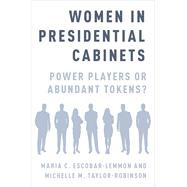Women in Presidential Cabinets Power Players or Abundant Tokens?
, by Escobar-Lemmon, Maria C.; Taylor-Robinson, Michelle M.- ISBN: 9780190491420 | 0190491426
- Cover: Hardcover
- Copyright: 8/1/2016
Though parity is still rare, presidential cabinets contain more women than ever before. Who are these women and what types of political capital resources do they bring to the administration? Are they new types of political players or very much like the men who have traditionally run the government? And once they gain office, are they treated equally in the cabinet? Do they have the capacity to be as effective as their male counterparts?
Drawing on data from five presidential democracies -- Argentina, Chile, Colombia, Costa Rica, and the United States -- Women in Presidential Cabinets examines the backgrounds, connections and credentials of all full-rank cabinet ministers in presidential administrations over the course of two decades to determine if women and men bring similar numbers and diversity of political capital resources to the administration. Maria C. Escobar-Lemmon and Michelle M. Taylor-Robinson find that, with a few notable exceptions, presidents select men and women with similar work and education backgrounds, political experience, and linkages to related interest groups. There are, however, differences across types of posts and countries. They evaluate the treatment and effectiveness of similarly credentialed male and female ministers on four benchmarks. Specifically, they examine whether women with equal qualifications can really obtain all posts or whether glass ceilings persist in some areas. They then turn to the ability of women to hold onto a post, considering the nature and circumstances surrounding their departures from office and how long they remain in office. In doing so, they uncover evidence that female ministers in Latin America stand on an unequal playing field when it comes to the ability to enact policy through legislation. Ultimately, Escobar-Lemmon and Taylor-Robinson show conclusively that while women lack numerical equality, they are no longer tokens, instead appearing positioned to exercise power at the highest levels within the executive branch.
Drawing on data from five presidential democracies -- Argentina, Chile, Colombia, Costa Rica, and the United States -- Women in Presidential Cabinets examines the backgrounds, connections and credentials of all full-rank cabinet ministers in presidential administrations over the course of two decades to determine if women and men bring similar numbers and diversity of political capital resources to the administration. Maria C. Escobar-Lemmon and Michelle M. Taylor-Robinson find that, with a few notable exceptions, presidents select men and women with similar work and education backgrounds, political experience, and linkages to related interest groups. There are, however, differences across types of posts and countries. They evaluate the treatment and effectiveness of similarly credentialed male and female ministers on four benchmarks. Specifically, they examine whether women with equal qualifications can really obtain all posts or whether glass ceilings persist in some areas. They then turn to the ability of women to hold onto a post, considering the nature and circumstances surrounding their departures from office and how long they remain in office. In doing so, they uncover evidence that female ministers in Latin America stand on an unequal playing field when it comes to the ability to enact policy through legislation. Ultimately, Escobar-Lemmon and Taylor-Robinson show conclusively that while women lack numerical equality, they are no longer tokens, instead appearing positioned to exercise power at the highest levels within the executive branch.







